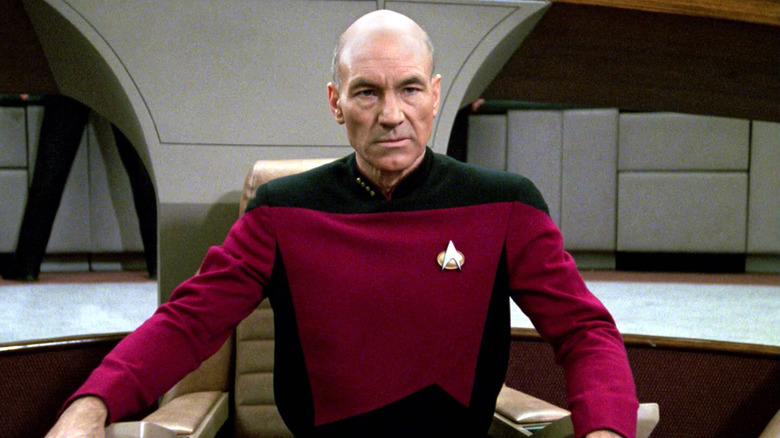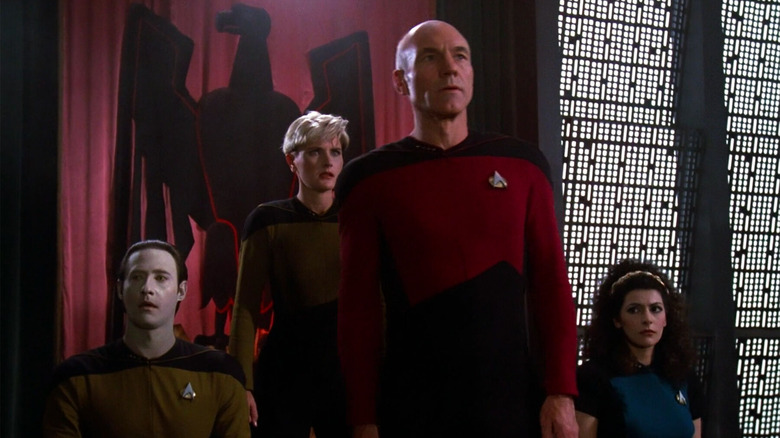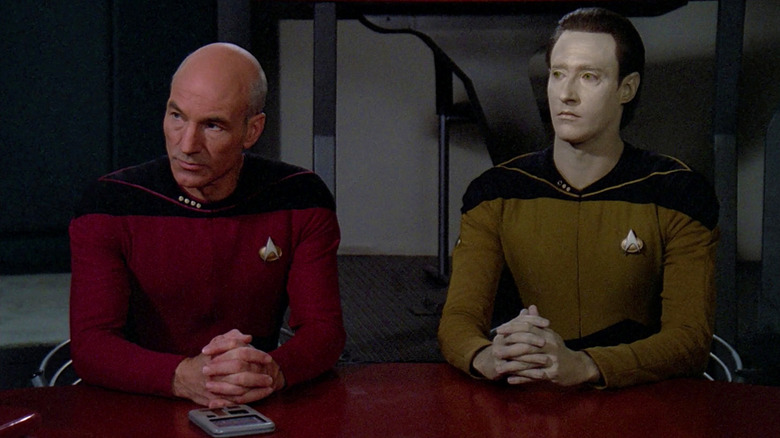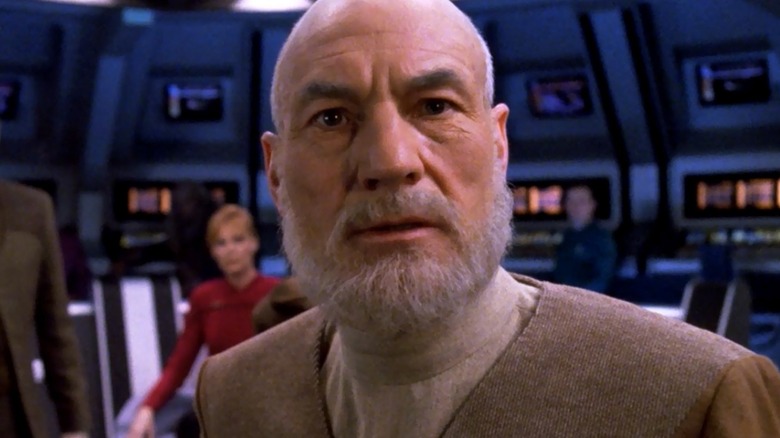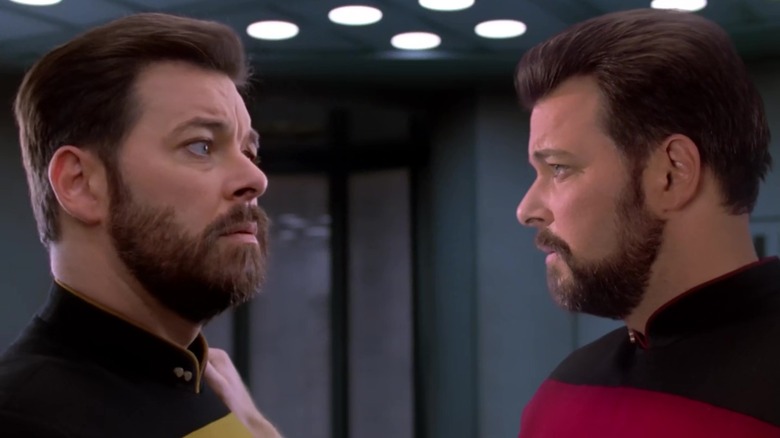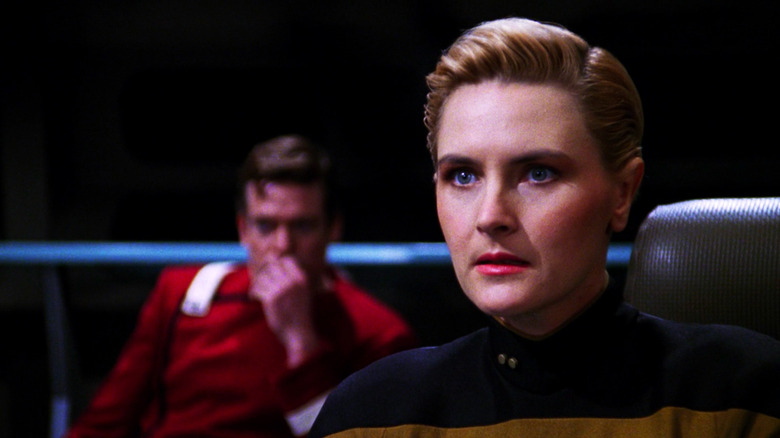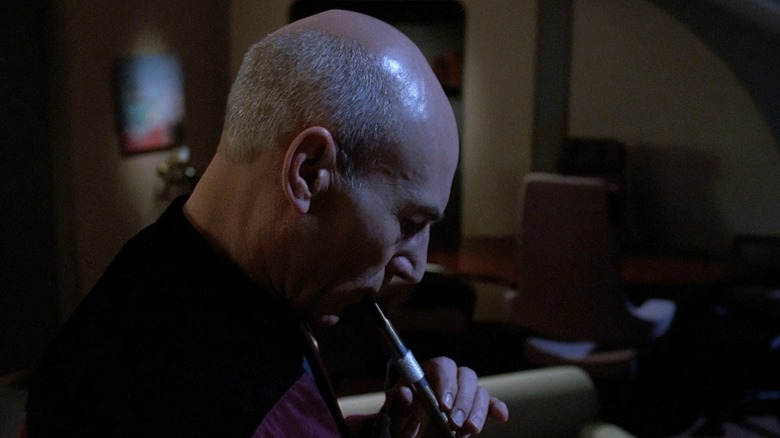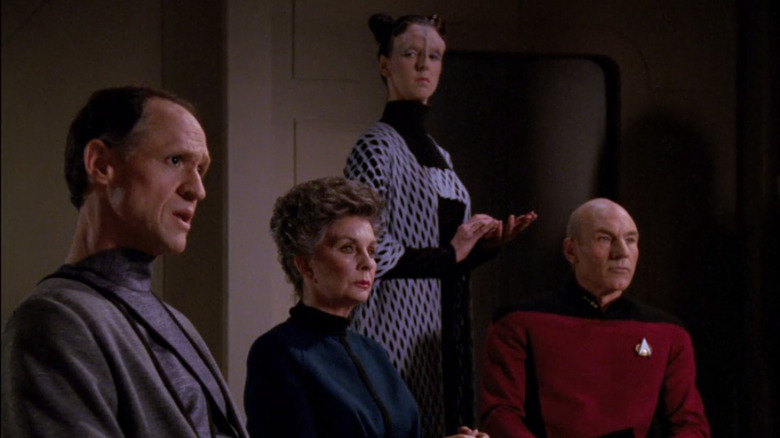Every Season Of Star Trek: The Next Generation Ranked Worst To Best
Gene Roddenberry's landmark series "Star Trek" changed the course of science fiction history when it debuted in 1966. Roddenberry imagined that humanity would learn to coexist peacefully in a progressive future, and a few of the series' coolest gadgets predicted actual achievements in science. Most importantly, audiences were invested in the characters: Captain James T. Kirk (William Shatner), Mr. Spock (Leonard Nimoy), and the rest of the crew of the USS Enterprise became instant icons in pop culture.
Although "Star Trek" was canceled after its third season, the franchise inspired a loyal fanbase. The saga prospered thanks to the success of the theatrical films, but the story's home was on television. Paramount Pictures assigned Rodenberry to create a follow-up series with a new set of characters. "Star Trek: The Next Generation" premiered on September 28, 1987, with the episode "Encounter at Farpoint."
"The Next Generation" introduced the crew of the USS Enterprise (NCC-1701-D), and took place a century after the original series. The new characters included Captain Jean-Luc Picard (Patrick Stewart), first officer William T. Riker (Jonathan Frakes), chief engineer Geordi La Forge (LeVar Burton), Klingon security chief Worf (Michael Dorn), medical officer Doctor Beverly Crusher (Gates McFadden), and the android Lieutenant Commander Data (Brent Spiner). The show ran for seven seasons, and the cast returned for four feature films. "The Next Generation" took the saga to new heights and developed more complex storylines than the original series. Here is every season of "The Next Generation," ranked worst to best.
7. Season 1
If you've never watched "Star Trek: The Next Generation" before, you should know that the show had a very rocky start. Eventually, "The Next Generation" would develop its own identity, but it began as a pale impersonation of its predecessor. The later seasons developed more complex narratives, but Season 1 featured a lot of "mission of the week" episodes. While perhaps this could have given the audience time to get to know the characters, the writers did not develop the crew beyond a few defining traits.
Compared to the overwhelming charisma of the original's Captain Kirk, Picard felt cold and obtuse. Data would go on to become a nuanced character, but in the first season, he does little more than crack jokes at his own expense. One of the show's best qualities was its humor, but Season 1 featured an overabundance of comedic episodes. Many of these episodes featured ludicrous premises, such as in "The Naked Now," where the crew becomes infected by a mysterious alien virus, causing them to act like they are drunk.
Even though the original series had established the importance of the Prime Directive, the episode "Justice" made fun of the Starfleet code. The obnoxious Wesley Crusher (Wil Wheaton) accidentally steps on a flower bed on the planet Rubicun III and is sentenced to death. Picard must decide whether the crew should violate the Prime Directive to spare his life. The first season also contains some offensive elements, like the episode "Code of Honor," which featured stereotypical Black characters and offended viewers.
6. Season 2
Season 2 was a major improvement over the first season, but "The Next Generation" was still finding its footing. There were a few change-ups to the cast due to the inconsistent writing. Lieutenant Natasha Yar (Denise Crosby) was killed off in the first season, and Doctor Crusher temporarily left the series. The new medical officer, Doctor Katherine Pulaski (Diana Muldaur), was introduced, but her discriminatory behavior did not mesh well with the rest of the characters. As a result, Crusher returned in Season 3.
One of the bright spots of the season was the first appearance of the fan-favorite character Guinan, played by the legendary actress Whoopi Goldberg, who was a massive fan of the original series. She said that she was inspired to begin acting after she saw a positive portrayal of a Black female character, Nichelle Nichols' Lieutenant Uhura. Although she initially appears as the ship's bartender, Guinan is actually an ancient being with mystical abilities. She added an aura of wisdom, and a sense of humor, to the show.
Some of the episodes in Season 2 also rank among the best in the entire series. In "The Measure of a Man," Commander Bruce Maddox (Brian Brophy) visits the ship and demands to "disassemble" Data for research purposes. Data refuses the order and states that he is an individual, not a piece of property. Picard must defend Data in a trial to determine if he is a legal citizen. It was one of the franchise's best moral dilemmas.
5. Season 7
The original series was canceled after its third season, preventing the characters from getting a proper send-off. There was potential to continue their stories, but it was squandered. "The Next Generation" had the exact opposite problem; the show ran for too long, and by the last season, the writers struggled to find new ideas. As a result, Season 7 took some of the characters in uninteresting directions.
A strange romance between Worf and Troi was introduced. It was an odd pairing, mainly because the previous seasons had not hinted at any romantic chemistry between them. While the show definitely did a great job developing the Klingon culture, the Worf-centric episodes that focused on his heritage in Season 7 were lackluster. Worf and his son attend a ritual ceremony in the episode "Firstborn," and later Worf deals with his brother's misbehavior in the episode "Homeward." These familial conflicts felt melodramatic.
Some of the episodes from the final season were actually embarrassing. The episode "Sub Rosa," for example, featured a confusing storyline in which Doctor Crusher is possessed by her grandmother's spirit. The overt sexual themes were very uncomfortable to watch. "Star Trek" fans voted the episode as one of the worst in any of the shows, not just "The Next Generation." However, Season 7 did have a great ending with the two-part finale "All Good Things..." The time-jumping adventure centered on Picard, who is transported between the past, present, and future by Q (John de Lancie). It was a perfect closing note for the series.
4. Season 6
By its sixth season, "Star Trek: The Next Generation" had settled into the definitive versions of its characters. While Season 6 didn't have as many strong villains, it did a great job fleshing out each member of the crew. Picard had been put through the emotional ringer in the previous two seasons, and Season 6 allowed more insights into his past. The episode "Tapestry" showed flashbacks to Picard's experiences as a young officer, and explored an early mistake that has haunted him ever since. The season premiere episode, "Time's Arrow, Part II," revealed how Picard first met Guinan, and how different their relationship was in the beginning. Additionally, even though Picard continued to struggle with his feelings for Doctor Crusher, he also fell in love with the cartographer Lieutenant Commander Nella Daren (Wendy Hughes) in the episode "Lessons."
Meanwhile, Riker considered what was in store for his future. The episode "Second Chances" featured flashbacks to his youth and introduced a doppelganger of Riker from a different timeline. The story showed how Riker's lifelong desire to become a captain began, and how he first fell in love with Troi. Their early flirtations were certainly amusing.
"The Next Generation" did a great job of forging its own path, but Season 6 featured a fun homage to the original series. Montgomery Scott (James Doohan) appeared in the episode "Relics." Scotty didn't just appear for nostalgia's sake, though; the character played an important role in the story.
3. Season 3
After the underwhelming first two seasons, "The Next Generation" finally turned things around in Season 3. Instead of pitting the crew against small-scale threats that could easily be solved by the end of an episode, the third season introduced more profound stakes. Each of the characters is tested emotionally, and the writers did a great job giving them each showcase episodes.
Data's desire to become human was developed in an interesting way. In the episode "The Offspring," Data creates a child that he names Lal (Hallie Todd). He learns about the responsibilities of parenthood, and begins to develop his own emotional attachments. Data's importance to the crew was also solidified when he's captured in the episode "The Most Toys."
Season 3 also allowed "The Next Generation" the chance to rectify one of its early mistakes. After she was abruptly killed off towards the end of Season 1, Natasha Yar returned for the episode "Yesterday's Enterprise." The beautiful story gave Denise Crosby a proper goodbye and showed how her death had affected the crew.
The final episode of the season, "The Best of Both Worlds, Part I," began the most important storyline in the entire series. After they were teased in earlier episodes, the fearsome villains the Borg attacked the Enterprise and kidnapped Picard. Picard's fate was left in the balance until the beginning of Season 4. It was the first time that "The Next Generation" truly felt like event television, and the cliffhanger was the perfect way to draw in skeptical viewers.
2. Season 5
Season 5 was the most emotional of "Star Trek: The Next Generation." It was the first season to air after the death of Gene Roddenberry, who died of cardiac arrest on October 24, 1991. Patrick Stewart decided to temporarily halt production during the filming of the episode "Hero Worship" so the cast could take a moment to honor the franchise's original creator.
Stewart gives his best performance in the fifth season. In the episode "The Inner Light," Picard falls into an unconscious state after he is struck by an alien laser blast. Picard awakens in another world, where he has the name "Kamin." As Kamin, Picard experiences an entire lifetime on the non-Federation planet Kataan. He lives for 40 years as a family man before he is revived back on the bridge of the Enterprise, only moments after falling unconscious, and returns to his duties as captain. "The Inner Light" explored a familial side to Picard, which he had hidden from the rest of the crew.
While the show established Picard's resilience, he is also at his most vulnerable in Season 5. In the episode "Darmok," Picard is stranded on a desolate planet and forced to communicate with the bizarre Tamarian aliens. Picard also begins to slowly get over his aversion to children, bonding with a group of elementary school students when they are stranded together in the episode "Disaster." Additionally, Season 5 features the memorable return of Leonard Nimoy as Ambassador Spock. In the two-part episode "Unification," Picard and Data travel to Romulus to investigate Spock's whereabouts and his disappearance.
1. Season 4
Season 4 opened with a thrilling conclusion to Picard's capture in "The Best of Both Worlds, Part II." The premiere episode established Picard's post-traumatic stress disorder following his experiences with the Borg. Picard's remaining animosities toward his kidnappers became the central theme of the 1996 film "Star Trek: The First Contact," the second and best of the film series that starred "The Next Generation" cast. The fourth season did not let Picard rest easy, but he got the chance to reunite with his family in France in the next episode, "Family." The slowly-paced episode showed that "The Next Generation" was capable of more mature stories, which didn't require a lot of action.
There were also storylines that explored the franchise's political themes. In the episode "The Drumhead," Jean Simmons guest-starred as Norah Satie, the former admiral of Starfleet Command's Legal Division of its Support Services Section. Satie becomes convinced that there is a Romulan spy onboard the ship, and insists on investigating each member of the crew. She even accuses Picard of being a traitor. Satie refuses to set aside her investigation, even after Geordi and Data discover evidence that proves her wrong. It was a scary parallel to totalitarian regimes.
Season 4 also continued to develop the Klingon culture. In the season finale, "Redemption, Part I," Worf is forced to temporarily abandon his post in order to participate in a Klingon civil war. It set up an exciting story for the next season.
